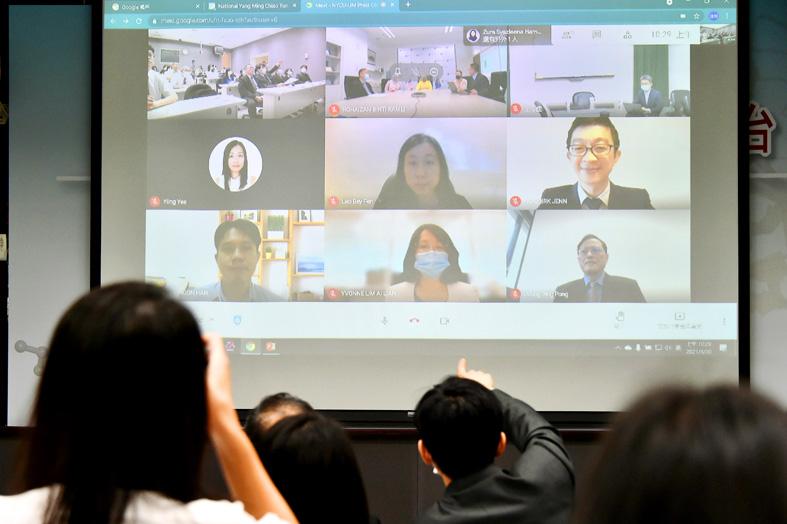A Taiwanese-Malaysian research team has developed a platform to identify drugs that might inhibit COVID-19 infections, which screens massive databanks of existing medicines.
The platform was developed to help scientists find drugs developed to treat other diseases that might prove efficacious against COVID-19, the developers yesterday told a news conference held by National Yang Ming Chiao Tung University (NYCU) in Taipei.
Chang Chia-ching (張家靖), a professor in the university’s Department of Biological Science and Technology, said that the SARS-CoV-2 virus, which causes COVID-19 infections, attaches itself to the ACE2 receptor on human cells.

Photo: Tu Chien-jung, Taipei Times
“Identifying ACE2 inhibitors rapidly is a top priority,” Chang said.
The researchers developed the platform to detect modulators that affect the interaction of SARS-CoV-2 and ACE2 using the electrochemical impedance spectroscopy (EIS) measurement technique.
The team thus far identified ramipril and perindopril, two medicines developed for treatment of cardiovascular diseases, as potentially interfering with the interaction of the virus and the cell, Chang said, adding that it also found another drug, enalapril, that might have a reverse effects.
The platform could also be used to search for medicines for treatment of other infectious diseases or even cancer, Chang said.
Kiew Lik-Voon, a professor in the University of Malaya’s Department of Pharmacology who is a member of the team, said that the medicines identified by the platform are preliminary results, adding that more work would have to be done to evaluate the drugs’ clinical effect.
Shieh Dar-bin (謝達斌), a professor in National Cheng Kung University’s (NCKU) Institute of Oral Medicine who is also a member of the team, praised the research as an example of successful cross-field collaboration.
The team comprised specialists from different academic areas, from electronic engineering to cell biology, he said.
NYCU president Lin Chi-hung (林奇宏) called the invention “inspiring,” saying that it was the result regular cooperation between Taiwanese and Malaysian researchers
University of Malaya vice president Noorsaadah Binti Abd Rahman attended the event via videoconferencing, saying that she was thankful for the participation of the Taiwanese researchers and hopes that more drugs would be identified.
The Taiwanese team members are from NCKU, NYCU, Chang Gung University, Taipei Veterans General Hospital and National Changhua University of Education.
Their study, titled “Development of flexible electrochemical impedance spectroscopy-based biosensing platform for rapid screening of SARS-CoV-2 inhibitors,” was published in last month’s issue of the Biosensors and Bioelectronics journal.

Taiwan would welcome the return of Honduras as a diplomatic ally if its next president decides to make such a move, Minister of Foreign Affairs Lin Chia-lung (林佳龍) said yesterday. “Of course, we would welcome Honduras if they want to restore diplomatic ties with Taiwan after their elections,” Lin said at a meeting of the legislature’s Foreign Affairs and National Defense Committee, when asked to comment on statements made by two of the three Honduran presidential candidates during the presidential campaign in the Central American country. Taiwan is paying close attention to the region as a whole in the wake of a

Chinese Nationalist Party (KMT) Chairman Eric Chu (朱立倫), spokeswoman Yang Chih-yu (楊智伃) and Legislator Hsieh Lung-chieh (謝龍介) would be summoned by police for questioning for leading an illegal assembly on Thursday evening last week, Minister of the Interior Liu Shyh-fang (劉世芳) said today. The three KMT officials led an assembly outside the Taipei City Prosecutors’ Office, a restricted area where public assembly is not allowed, protesting the questioning of several KMT staff and searches of KMT headquarters and offices in a recall petition forgery case. Chu, Yang and Hsieh are all suspected of contravening the Assembly and Parade Act (集會遊行法) by holding

President William Lai (賴清德) has appointed former vice president Chen Chien-jen (陳建仁) to attend the late Pope Francis’ funeral at the Vatican City on Saturday on his behalf, the Ministry of Foreign Affairs said today. The Holy See announced Francis’ funeral would take place on Saturday at 10am in St Peter’s Square. The ministry expressed condolences over Francis’ passing and said that Chen would represent Taiwan at the funeral and offer condolences in person. Taiwan and the Vatican have a long-standing and close diplomatic relationship, the ministry said. Both sides agreed to have Chen represent Taiwan at the funeral, given his Catholic identity and

PRAISE: Japanese visitor Takashi Kubota said the Taiwanese temple architecture images showcased in the AI Art Gallery were the most impressive displays he saw Taiwan does not have an official pavilion at the World Expo in Osaka, Japan, because of its diplomatic predicament, but the government-backed Tech World pavilion is drawing interest with its unique recreations of works by Taiwanese artists. The pavilion features an artificial intelligence (AI)-based art gallery showcasing works of famous Taiwanese artists from the Japanese colonial period using innovative technologies. Among its main simulated displays are Eastern gouache paintings by Chen Chin (陳進), Lin Yu-shan (林玉山) and Kuo Hsueh-hu (郭雪湖), who were the three young Taiwanese painters selected for the East Asian Painting exhibition in 1927. Gouache is a water-based